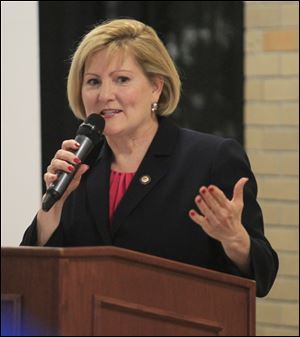
Rep. Fedor looks to modify Safe Harbor Act
Lawmaker says no one under 18 should be considered a prostitute
4/8/2013
Teresa Fedor spoke at the 10th annual Yell & Tell rally in Sylvania Sunday.
COLUMBUS — Last year Rep. Teresa Fedor (D.,Toledo) ran into resistance with “the senators” when she attempted to draw a clear line stating no one under the age of 18 could be considered a prostitute.
She compromised then to get her anti-human trafficking law to Gov. John Kasich’s desk, but she said today she’s ready to bring the fight anew.
“These victims under 18 are not consenting,” she said. “This has nothing to do with consenting to sex. This has to do with purchasing the rape of a minor. Basically, we have to say what it is. You’re not allowed to purchase the rape of a minor.”
The latest bill that Ms. Fedor will introduce this week would eliminate a two-tier system put in place with passage of her Safe Harbor Act, a compromise that established different penalties and burdens of proof when it comes to prosecuting “johns” for soliciting sex with a minor.
Her latest bill eliminates the second tier that treated crimes involving children aged 16 and 17 less severely than those involving younger children. Anyone who buys the sexual services of someone under the age of 18 would be prosecuted for a felony and would have to register as a sex offender.
She walks into the House already with enough bipartisan votes for passage. Fifty-three of the 99 members of the chamber have signed on as co-sponsors. Then the fight returns to the Senate.
The Safe Harbor Act enacted last year, pushed with the help of Republican Governor Kasich, attempts to treat child prostitutes more as victims than criminals. It increased criminal penalties for those who sell them and buy their services and encouraged juvenile court judges to divert trafficking victims to treatment, counseling, and other services instead of jail.
It allows victims to sue those who trafficked them and allow police to confiscate traffickers’ assets to help fund the services. Despite its other strengths, anti-human-trafficking groups criticized the law because of the age-of-consent issue.
Kasich spokesman Rob Nichols said the governor’s office is reviewing the recommendations.
“We agree that we should move the ball forward on this issue,” he said. “We’re looking forward to working with her to that end.”
The latest bill, dubbed the “End Demand Act,” would also:
—Extend the statute of limitations for trafficking-related crimes from six years to 20.
—Extend rape shield laws to trafficking victims so that their past sexual activity in general cannot be presented as evidence to impugn their testimony against an offender.
—Prohibit advertising “massage” services unless the advertiser is certified by the state, a move designed to crack down on prostitution dens fronted by massage parlors.
—Prohibit the purchase of advertising that describes sexual activity for hire with a minor.
“It’s very important that this legislation be passed,” said Elesondra DeRomano, founder of Toledo-based Standing Together Against Real Slavery (STARS). “If this had been around when I was being trafficked, it just would have been made a huge deal.”
She worked with victims involved in the 2005 federal sting based inHarrisburg,Pa.that broke up a sex-trafficking ring involving 177 females. Seventy-seven of the victims were from theToledoarea, including a 10-year-old girl.
Contact Jim Provance at: jprovance@theblade.com or 614-221-0496.